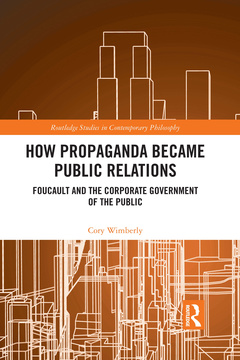How Propaganda Became Public Relations Foucault and the Corporate Government of the Public Routledge Studies in Contemporary Philosophy Series
Auteur : Wimberly Cory

How Propaganda Became Public Relations pulls back the curtain on propaganda: how it was born, how it works, and how it has masked the bulk of its operations by rebranding itself as public relations. Cory Wimberly uses archival materials and wide variety of sources ? Foucault?s work on governmentality, political economy, liberalism, mass psychology, and history ? to mount a genealogical challenge to two commonplaces about propaganda. First, modern propaganda did not originate in the state and was never primarily located in the state; instead, it began and flourished as a for-profit service for businesses. Further, propaganda is not focused on public beliefs and does not operate mainly through lies and deceit; propaganda is an apparatus of government that aims to create the publics that will freely undertake the conduct its clients? desire.
Businesses have used propaganda since the early twentieth century to construct the laboring, consuming, and voting publics that they needed to secure and grow their operations. Over that time, corporations have become the most numerous and well-funded apparatuses of government in the West, operating privately and without democratic accountability. Wimberly explains why liberal strategies of resistance have failed and a new focus on creating mass subjectivity through democratic means is essential to countering propaganda.
This book offers a sophisticated analysis that will be of interest to scholars and advanced students working in social and political philosophy, Continental philosophy, political communication, the history of capitalism, and the history of public relations.
Introduction: From Propaganda to Public Relations
Chapter 1: What Does Propaganda Do?
Chapter 2: Propaganda Contra Liberalism
Chapter 3: The Art and Science of Controlling Minds: The Influence of Political Economy and French Royalism on Public Relations
Chapter 4: Governing Mr. and Mrs. Intelligence Quotient Minus: Lineages of Crowd Psychology in the Governmentality of Propaganda
Chapter 5: Crossing the Atlantic, Propaganda’s New Problematization for Corporate America
Chapter 6: Edward Bernays and the Interacting Forces That Govern Public Opinion
Chapter 7: Grappling With Propaganda Today
Cory Wimberly is Associate Professor of Philosophy at the University of Texas Rio Grande Valley, USA
Date de parution : 06-2021
15.2x22.9 cm
Date de parution : 11-2019
15.2x22.9 cm
Thèmes de How Propaganda Became Public Relations :
Mots-clés :
Public Relations Counsels; IG Farben; Tobacco Cessation; Highest Physical Health; Vice Versa; Monotonous Norm; PR Counsel; Ardent Zeal; Crowd Psychology; Stock Commentary; Business Enterprise; Civil Society; Early Public Relations; Target Public; Lippmann’s Public Opinion; Publicity Bureau; Le Bon’s Work; Crystallizing Public Opinion; Limit Screen Time; Consumer Identity Project; Raspberry Pi; Transactional Reality; Adolf Hitler; Governmental Force; Potted Meat



